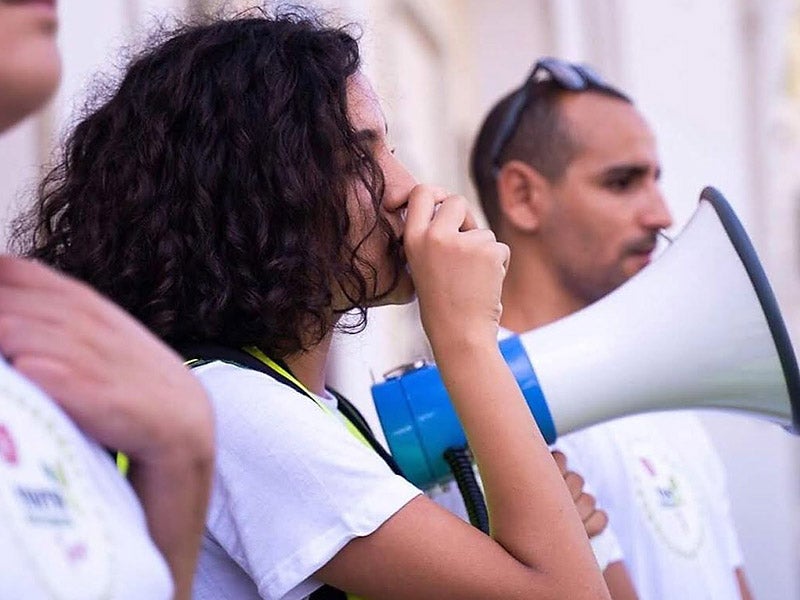Tunisia’s Youth are Demanding Climate Action
"We are all scared about our future, but together, we can support each other and talk about it, not keep it hidden," says 18-year-old Rima Rahmani.

This page was published 3 years ago. Find the latest on Earthjustice’s work.
“Being Tunisian automatically makes me demand climate justice.”
So says 18-year-old activist Rima Rahmani, from her hometown of Kairouan in central Tunisia. She knows the pain of worsening climate through her grandfather’s struggles.
“My grandpa is a small farmer and can’t afford to buy water,” she says. “He sees his trees dying every day because there isn’t enough rain, but the government does not provide financial help to small farmers. It was really frustrating to see him suffer and learn that it’s connected to climate change.”
Across the country, Tunisians are dealing with a multitude of climate-related impacts, from historic droughts to deadly floods. The month of August in 2021 shattered records for the country’s hottest temperature at 49 degrees Celsius (120 degrees Fahrenheit). Water scarcity has prompted utilities to randomly shut off the water supply, forcing locals to find bottled sources instead. High humidity is breeding crop-killing diseases. And in a country where 20 percent of the population is employed in agriculture, sparse rainfall has withered crops, fueling a mass migration of rural farmers to the capital of Tunis in search of work. The lack of job prospects has also greatly disenfranchised Tunisia’s youth: the country has one of the highest rates of high school dropouts in the North African region.
Climate impacts are changing the landscape of Southwest Asia and North Africa. Massive wildfires have engulfed olive groves in Lebanon, burned forests in Palestine and Israel, and killed at least 65 people in Algeria. Lack of rainfall has exacerbated water insecurity in every country, yet political dissension between neighboring countries and Western-backed proxy wars have stymied cross-border coordination of water distribution. A decade after Tunisia spurred the Arab Spring and promises of democracy, it and other SWANA countries have slid back toward authoritarianism.
Despite having to contend with these political factors, people are beginning to fight for climate justice—especially youth-led initiatives like the Arab Youth Climate Movement Qatar and the Moroccan Youth Climate Movement. Young people are demanding action from their own governments and global leaders with an increasing sense of urgency, as political and environmental instability threatens their futures.
“Any person born and raised in a poor region can be a climate activist,” says Rahmani. “Seeing my own people suffer from these extreme weather events without government action on climate really pushed me to organize.”
Bolstered by Greta Thunberg’s international school strikes that rallied millions of youths to demand climate action from their governments, Rahmani and her schoolmate Mohamed Jaouadi decided to be the change they sought. In 2019, they organized their first Fridays for the Future strike under the name Youth For Climate Tunisia.
It was the spark that Tunisia’s youth had been waiting for.
Channeling anger into action
YFCT’S school strikes and social media posts holding the government accountable for climate inaction have attracted hundreds of young Tunisians. Supporters began joining Rahmani on the streets, writing letters to newly elected politicians and disseminating climate education online.
“We are the next generation,” says Rahmani. “We are going to face climate change more than the current older generations. Being a young Tunisian and facing worsening climate change 20 or 30 years ahead, I thought: This is only getting worse. We can’t stay silent; we need to act.”
That first strike was small but symbolic. The handful of teenagers who joined came with handmade signs and an eagerness to help, encouraging Rahmani to keep trying.
As with any movement, YFCT drew the ire of people who were decidedly not their target audience.
“Adults were rude to us,” Rahmani says. “They told us to stop trying and go back to school–all the things adults say to intimidate young activists. But we were encouraged by young people sending us tons of messages, telling us to organize strikes in more regions and keep going. People sent us pictures of their regions suffering from floods and droughts. Young people showed that we are all scared about our future, but together, we can support each other and talk about it, not keep it hidden.”
YFTC began addressing the Ministry of the Environment, which is responsible for implementing sustainability plans and enforcing environmental protections. The group centered marginalized groups who have suffered the most from extreme weather in YFTC’s demand that the government declare a “state of climate emergency.”
Finding community in climate grief – and hope
“I have met my best friends in Youth for Climate,” says Rahmani. “People who share your interest and are as eager to go out in the street and yell – you don’t find them just anywhere.”
There is some cause for optimism for Tunisia’s climate future. Last year, the government submitted revised goals under the UN Paris Agreement to “conditionally” reduce carbon emissions to 45% below 2010 levels by 2030 and increase climate education in schools.
But those ambitious pledges are offset by Tunisia’s volatile political landscape. In March, President Kais Saied dissolved the democratically elected parliament, granted himself broad judicial powers, and vowed to rewrite the constitution that resulted from the 2014 Arab Spring. The COVID-19 pandemic has stretched the country’s troubled financial resources, putting funding for climate policies back into question.
Rahmani’s frustration with her government is acute, but she by the continually growing support for YFCT’s school strikes. In March, the group organized a strike to honor victims of floods and demand the government protect Tunisian people by acting on climate.
“When we have the right number, they are going to listen,” she says. “One day, we’re going to have a really massive strike and it’s going to change something.”